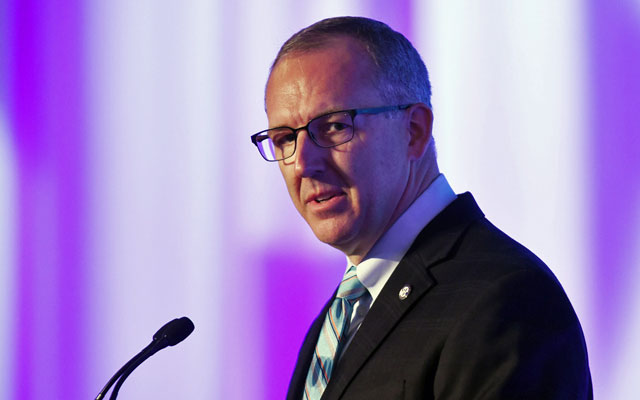SEC commish: We will evaluate player conduct
 Greg Sankey set his first agenda at the SEC media days. (USATSI)
Greg Sankey set his first agenda at the SEC media days. (USATSI)
HOOVER, Alabama — At his first major address as SEC commissioner, Greg Sankey laid out aspirational goals that include changing how prepared high school students are for college, never having an SEC team get banned from the postseason, and studying what role the conference should have in player conduct.
Oh, and he also quoted Bob Dylan, leaving former SEC commissioner Mike Slive’s Winston Churchill references for the past. The times they are a changin’ — sort of.
Sankey offered a different way of messaging, beginning the day by televising live on Periscope his entrance into the SEC media days hotel and then speaking in front of three large video screens and taking questions from the podium. It was in stark contrast to Slive’s style for 13 years as commissioner.
In reality, even if the presentation is different, the messenger is similar. Sankey is very much an NCAA insider who has been shaping policy for a while. He inherits a period of uncertainty for college sports given litigation challenging the NCAA’s amateurism model and whether it educates athletes.
Instead of focusing on freshman ineligibility, as Big Ten commissioner Jim Delany has done, Sankey said the attention should be on creating a “college-going culture” through academic progress in high school.
“We’re talking about other things. I’d like to shift the focus,” Sankey told CBSSports.com. “I think the (NCAA) eligibility rules provide a bit of that opportunity if we set the expectation that freshman year, sophomore year, junior year, senior year, you make progressions all the way through high school.
“We’re really concerned about something called early recruiting. What if there’s some communication earlier about academic expectations? We’ve got people on our campuses that receive great attention when they show up in high school. Maybe there’s some synergy between these types of issues that change the tone of the conversation. I don’t think I need all the answers or have all the answers, just a shift in how we think about issues.”
The SEC recently created a new transfer rule preventing any player from entering the conference after being dismissed by a school for serious misconduct against women. Sankey announced Monday a working group will examine expectations for schools and the SEC when handling player conduct.
“Clearly coaches have a responsibility for the young people on their rosters,” Sankey said. “That’s clear today, and I think that’s been clear over time.”
Another SEC working group will look at how the conference handles NCAA rules and compliance. The working groups, led by an SEC president or chancellor, will last 12 to 24 months, Sankey said.
“Our goal is to never return a championship, never pull down a championship banner, never vacate any wins, never have any team banned from postseason play due to NCAA infractions,” Sankey said.
The SEC hasn’t had a team in any sport receive a postseason ban due to NCAA violations since 2004.
“(Vanderbilt basketball coach) Kevin Stallings asked me directly, ‘Are we going to take our eye off that focus?’” Sankey said. “The answer is no. Football is a more indirect question, but it’s on the minds of our coaches because they’ve seen we can still achieve the success we want competitively yet not operate in the shadows.”
Sankey knows the SEC’s reputation of bending rules off the field hasn’t necessarily changed. “Yes, people still may have their opinions,” he said. “They may not be informed opinions. I’d like to inform those opinions and reshape them.”
Presentation appears to be very much on Sankey’s mind. The SEC said one player from each team was invited to media days because of a positive personal story each could tell. Sankey coined a phrase, “Scholars first, champions second,” that will inevitably invite cynicism from critics of college sports’ multi-billion-dollar industry.
During his speech to a large media gathering, Sankey showed a video featuring off-the-field stories of 14 SEC players and mentioned ex-SEC players who have returned to school to graduate.
“When I’m told a football player can’t ever do internships or study abroad, I can watch a video of a young person who did,” Sankey said. “Now, it’s at Vanderbilt, I’ll give you that, or an aerospace engineer at Tennessee. That doesn’t happen to everyone on our football roster, but it happens. I don’t see space for that story, so if I have to create space, I’ll be happy to create space for that type of story.”
As Sankey gave his speech, tweets from his new Twitter account were being sent out with some of his aspirational messages. No, he didn’t use telepathy or schedule his Twitter account to send out the tweets. Sankey circled what to say in advance and had a staffer tweet it out at the right moment.
“I’m effective, but I’m not quite that effective,” Sankey said.
This entry passed through the Full-Text RSS service – if this is your content and you’re reading it on someone else’s site, please read the FAQ at fivefilters.org/content-only/faq.php#publishers.